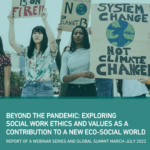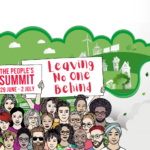Forum Replies Created
-
AuthorPosts
-
Rene
ParticipantA few thoughts after listening to the really interesting presentation on transformation changes in social work practice. Thanks for a thought provoking presentation. It was enlightening to hear how quantum science understands more clearly ideas of interdependence, self-organising dynamics, and the robust nature of far-from-equilibrium than the positivist hegemonic knowledge systems that dominated and suppressed indigenous knowledge systems during colonialism and that remain hegemonic today. Im still questioning the canopy concept- so for discussion: Im not sure the sort of peaceful co-existence it envisages, while a valid aspiration, is feasible in todays inequitable, violent capitalism, where in a battle for ideas, positivist systems deliberately hide the subjectivity of powerful actors and discount and over-ride knowledge and experience that exerts meaningful challenge. The notion of ‘neutrality’ of knowledge in positivist systems needs challenge and exposure of the values being applied (not the canopy but the ‘roots of the trees’), even while we demand, nourish and ‘grow’ knowledge systems that reflect values, such as those articulated in the conference.
Rene
ParticipantThank you Richard for the thought provoking feedback and reflections, shared also with the colleagues from the other regions. I need a bit of time to digest your comments (and those from Sylvia, Georgiana and Sarah) and the ideas in your panel Richard and will come back to this later today to continue …
Rene
ParticipantThat would be great Richard- can you share the link to your panel please to listen to it please to better understand the ‘canopy shrinking’?
I think in talking about ‘indigenous knowledge’ we shouldnt exclude also organic knowledge, such as the knowledge collectively generated by workers in self-determined participatory processes linked to struggles to expose risks and burdens, to change working life and conditions, or to resist the externalisation of burdens in extractives. They bring critical learning from action.Rene
ParticipantThis is an important discussion. Our panel on Plural pathways and shared principles to co-building health in a new Ecosocial World (https://newecosocialworld.com/summit-programme/d2-concurrent8/) discusses
approaches to health and wellbeing in India, Latin America, East and Southern Africa and small island states that reflect a plurality of indigenous cultural understandings of health and also common features of collective interests, complementarity, and reciprocity, and in positioning health as a consequence of harmony with nature and spiritual forces. While subjugated to biomedical, biosecurity approaches during colonialism, across these settings, rights-based, social medicine approaches confronted the alienation and inequities generated by colonialism and exacerbated by neoliberalism, reviving early principles and adding new dimensions to confront an extractive globalisation, gender and other intersecting inequalities. So in line with what was raised earlier, its not the slogans and names but the shared values, principles, ways of constructing knowledge that we need to draw and communicate from these ideas and systems, together with what has enabled renewal and resistance to efforts to dominate and suppress them. (We really welcome comment on the panel!) -
AuthorPosts






